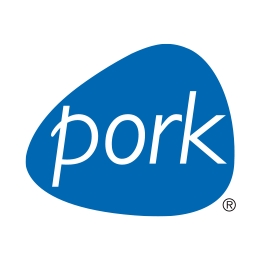Food systems research from the University of Washington shows pork meat to be protein rich, very affordable, and associated with lower greenhouse gas emissions.
Previous ideas about the role pork plays as part of a sustainable healthy diets may be wrong, according to a new perspectives study[1] published in the journal Advances in Nutrition by researchers at the University of Washington.
That’s because understanding how the affordability and sustainability of fresh pork intersect with its nutritional value has been missing from epidemiology research as well as public health nutrition policy reports due to the fact pork is often grouped with other red meats (such as beef or lamb) during analysis[2-4].
“Grouping pork in with other red meats in commonly used analysis tools such as the food frequency questionnaire can have consequences for the future of food, nutrition policy and meat production,” adds lead study author Adam Drewnowski, PhD, Professor of Epidemiology at the University of Washington. “Pork has a different nutrient profile, protein cost and impact on the environment than other red meats, and this can’t be captured when foods are combined into one ‘red meat’ category,” he explains.
As attention turns to the upcoming U.S. Dietary Guidelines 2025-2030, it is important to separate pork meat from other protein sources and from other meats to get the clearest idea of pork’s place in domestic and global recommendations around sustainable healthy diets.
Looking at publicly available data from U.S.-based and global datasets, Dr. Drewnowski examined the sustainability of pork as a source of meat protein, considering the sustainability framework domains of nutrition, affordability and environmental impact, as well as future food demand.
Perspectives on the place of pork in the sustainability framework were identified through a review of the literature, combined with some original analyses.
TAKE HOME MESSAGES INCLUDE
Pork meat is an excellent protein source.
- Pork delivers the maximum protein percent daily values (%DV) for the least calories.
- Pork has favorable protein quality scores (such as PDCAAS and DIAAS).
Pork meat is an affordable protein source.
- Pork provides one of the lowest cost ways to reach 100% daily value for dietary protein.
- Numerous cuts of fresh pork, including pork chop (baked, broiled, stewed, fried), pork roast, and pork steak/cutlet, were identified by the USDA Center for Nutrition Policy and Promotion as higher nutrient density and lower cost meats.
Pork meat has low greenhouse gas emissions.
- Mean greenhouse gas emissions (GHGE) estimates (in kg CO2 per 50 grams of protein) position fresh pork as significantly below beef and lamb, the other red meats, and closer to eggs, chicken and beans.
- Treating pork as a separate category from red meat and applying nutrition-based functional units may re-shape ideas about the environmental cost of animal protein (typically measured in terms of GHGE per product weight or volume (kg or L)).

The study also found that low- and middle-income countries (LMIC) are experiencing an increase in meat consumption due to less calories being consumed from starchy staples, cereals, and potatoes.
This makes the need to identify animal proteins that can be part of healthy sustainable diets even more critical[4]. The perspective identifies that pork is well positioned to meet the rising global demand for animal protein, and growing LMIC demand for animal protein was directed mostly toward chicken and pork, rather than beef.
“This perspective could not be more clear – red meats cannot be treated the same when it comes to recommendations on global sustainable healthy diets. We should be recalibrating our comparisons and paying attention to local contexts and specific food groups,” notes Dr. Drewnowski.
In summary, this new analysis confirms pork is an affordable high-quality protein that has a lower environmental impact than previously thought.
Read more about how treating pork separately from other red meats can help re-shape ideas about diets and health, and the environmental cost of meat production broadly.
*Analyses of publicly available USDA, FAO and World Bank data were supported by the National Pork Board. The funders were not involved in the development of databases, analytical models, data analysis or interpretation, manuscript preparation or the decision to submit the manuscript for publication.
References:
- Drewnowski A. Perspective: The place of pork meat in sustainable healthy diets. Advances in Nutrition. 2024;100213.
- Zheng Y, et al. Association of changes in red meat consumption with total and cause specific mortality among US women and men: Two prospective cohort studies. BMJ. 2019;365:l2110.
- Nutrition Assessment. Fred Hutch Cancer Center website. https://www.
fredhutch.org/en/research/ divisions/public-health- sciences-division/research/ nutrition-assessment.html. Accessed March 20, 2024. - Willett W, et al. Food in the Anthropocene: the EAT-Lancet Commission on healthy diets from sustainable food systems. Lancet. 2019;393(10170):447-492.
About National Pork Board

The National Pork Board has responsibility for Pork Checkoff-funded research, promotion and consumer information projects and for communicating with pork producers and the public. The Pork Checkoff funds national and state programs in consumer education and marketing, retail and foodservice marketing, export market promotion, production improvement, science and technology, swine health, pork safety, and environmental management and sustainability. For the past half century, the U.S. pork industry has delivered on its commitment to sustainable production and has made significant strides in reducing the environmental impact of pig farming. Through a legislative national Pork Checkoff, pork producers invest $0.35 for each $100 value of hogs sold. Importers of pork products contribute a like amount, based on a formula. For information on Checkoff-funded programs, pork producers can call the Pork Checkoff Service Center at (800) 456-7675 or visit www.pork.org.



